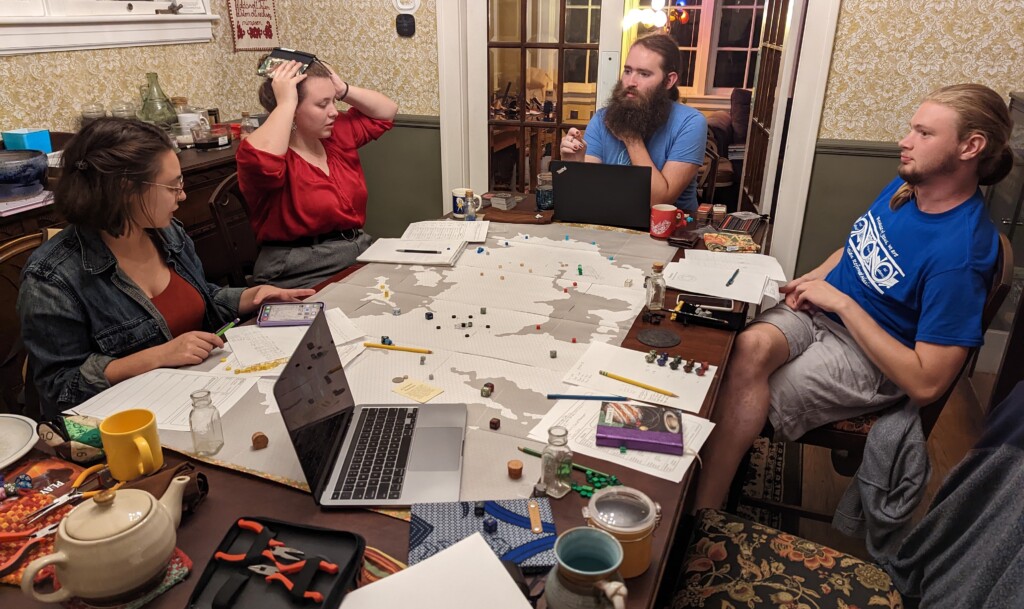Some of the most fun I had this year was watching Dungeons and Dragons: Honor Among Thieves with a friend I’ve played D&D with. We got excited calling out the spells and monsters we recognized, but our biggest reaction was to a magic item not found in any Dungeons and Dragons source material. The hither-thither staff is essentially a portal gun from the 2007 game Portal, shooting orange and blue doors that connect. Honor Among Thieves never shows players sitting around a table rolling dice, but by including the hither-thither staff, the film characterizes the person running the implied game in the best way.
Tabletop role-playing games are, at their core, collaborative storytelling. A game system provides the basic rules for a playgroup, which usually includes any number of characters players, who play specific characters, and the Game Master (GM) who is the narrator, controlling everyone and everything that isn’t a player character. GMs are also a sort of referee, enforcing the rules of the system to narrate what happens.
There comes a time in any game where the Game Master (GM) has to throw out the rules. While fifth-edition Dungeons and Dragons provides a good base, does anyone really want to play with encumbrance? The rules of Honey Heist are simple enough to understand, but what if the group wants to play more than one session? This is where GMs have the ability to homebrew, or make up rules for their own games not found in the written rules.
Homebrewing is important because it keeps experienced players on their toes. One session playing D&D in high school, as my GM described a big fight the group was about to have, our most experienced player rattled off exactly what each monster was and what its weaknesses were. I watched my GM game deflate, as the scenario she’d spent time preparing for became much easier. For people who play a lot, there will inevitably come a moment when the player will be able to recognize most enemies and items. Homebrewing is a way for GMs to offer new experiences to players who otherwise would get bored with the game.
Homebrewing is a way for GMs to say to their players “I’m invested in what we’re making together. Let’s try something new.” Homebrew content is the single best expression of love from a GM to their players.
When I get together with people from other playgroups, the things I get most excited to share are the totally unique things my GM has come up with. The Omi, a race of what are essentially clay pot people. The Midas Armor, which significantly buffed my paladin’s ability to tank hits, while also turning his blood gold. FILO’s Bag of Holding, which only lets characters take out the most recent item they’ve put in or risk taking damage. A subclass built specifically for a single player character. None of them are in any sourcebook.
I’m about to start GMing a game for a bunch of new players, and I’m pretty nervous about it. I tend to be the kind of person to rely on the rules too much to back me up. But I hope when the moment comes I’ll throw them out and do my own thing.




Happy GMing, Sam! If you or anyone else wants to experience some wonderfully homebrewed D&D, I can’t stop recommending Dimension 20, an actual-play show from the streaming service Dropout (with some seasons also available on YouTube). Almost every season is a standalone story in a homebrewed world, mostly GMed by my favorite storyteller, Brennan Lee Mulligan. The players are actors and improv comedians telling incredible tales around the table. If someone’s looking for a place to start, try Fantasy High or the Unsleeping City!
Thanks Geneva,
I cut a paragraph talking about how the GM hacked 5e with a lot of Good Society mechanics for D20’s A Court of Fey and Flowers.
I intentionally wrote this about TTRPGs in general and not just 5e, because I think while 5e is the most ubiquitous system, it’s very good at being Dungeons and Dragons, and if folks want to play a different genre, generally the best solution is not “let’s homebrew D&D,” but “let’s play a game built to do that,” and even in those games the rules aren’t exhaustive.
Also. I have met people who want to play 5e with encumbrance rules. They scare me.
I had one GM who wanted to start a 5e campaign where we actually adhered to spell component rules and I was secretly relieved when the campaign never got off the ground. Encumberance rules can go sit in a corner and think about what they’ve done 😉
I’m currently playing a FATE game, which uses very flexible rules and allows you to tweak your character’s traits and special skills between each session. It’s a refreshing change from the bulk of 5e.